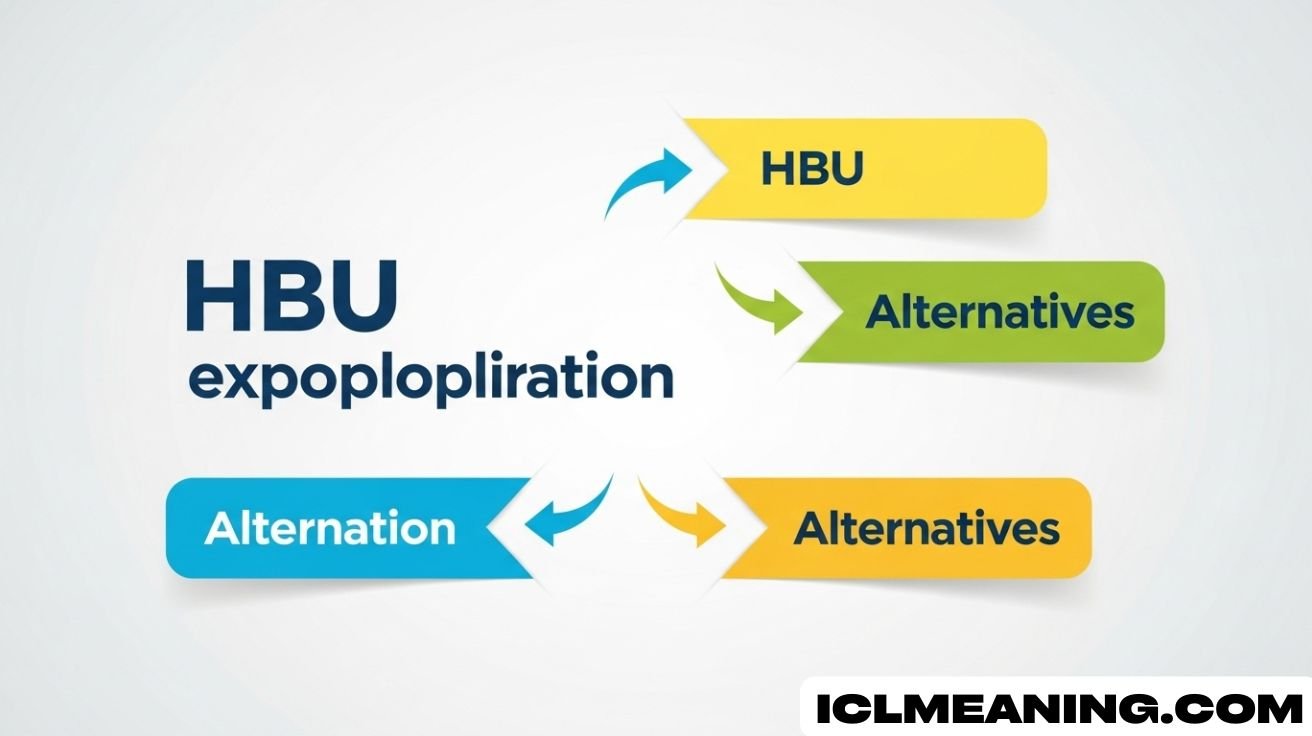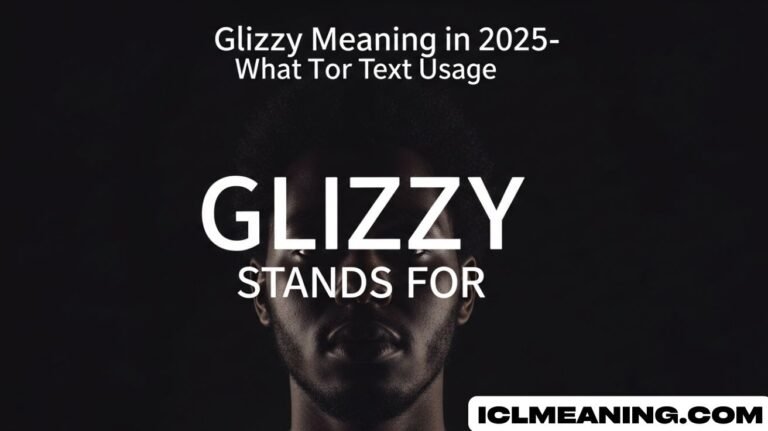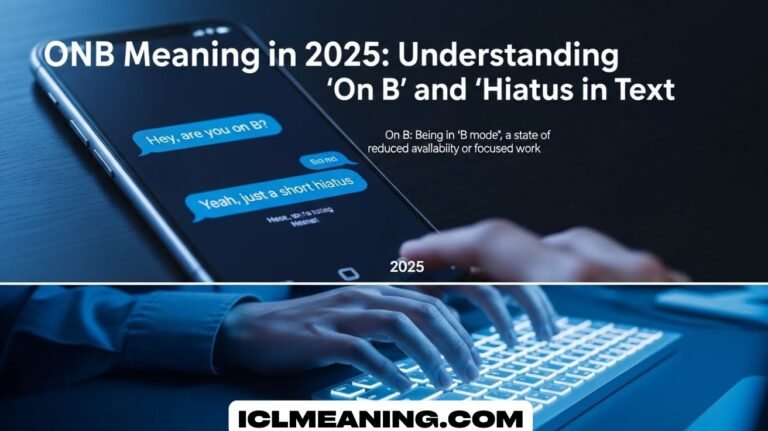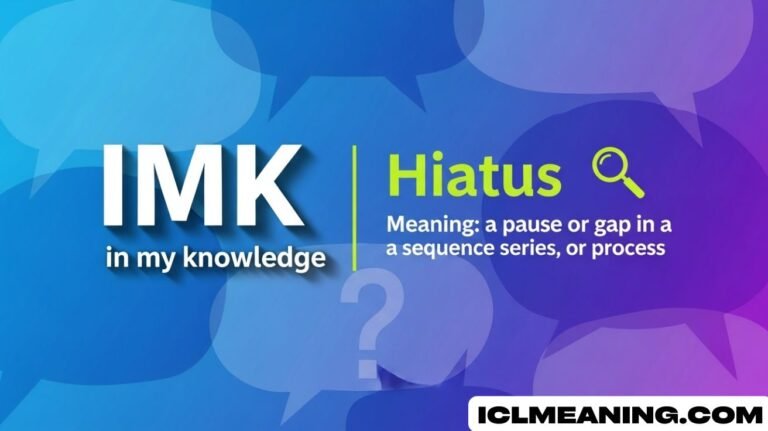HBU Meaning in chat: Understanding “hbu” and Polite Alternatives
HBU meaning in chat stands for “how about you?”. It’s a short and friendly way people use online or in text messages to ask the same question back. It helps make conversations quick and natural.
We see it everywhere — on Instagram, WhatsApp, and Snapchat. It’s fast, easy, and feels casual. But have you ever wondered when it’s okay to use it and when it’s not?
In simple terms, HBU in chat keeps messages short and friendly. It’s part of modern texting language and online talk. Knowing how and when to use it can make your chats sound smoother and more natural.
1. What Does “hbu” Mean?
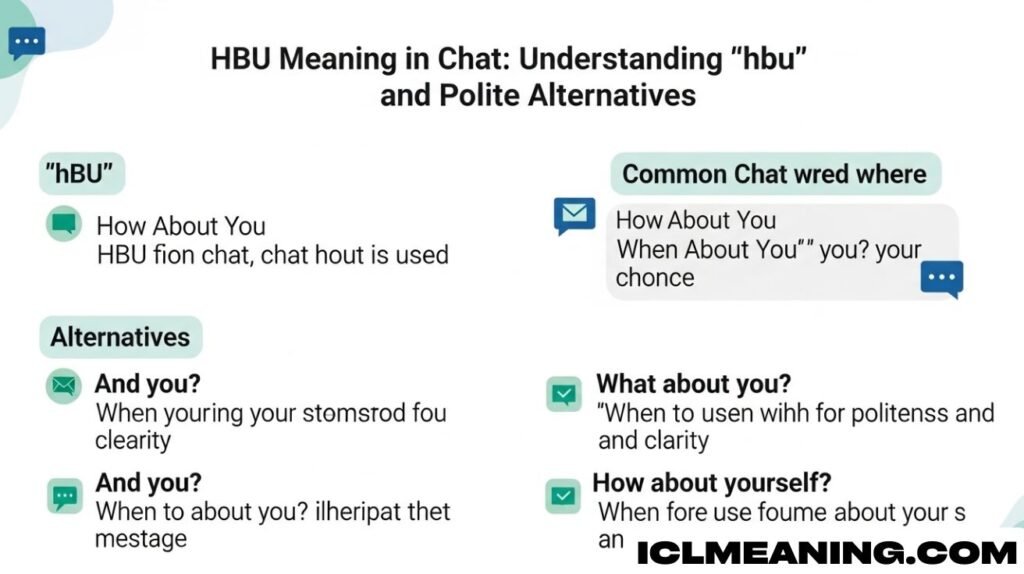
The hbu full form is “how about you?” It’s a casual question people use in chats to keep a conversation going. Imagine your friend says, “I’m watching Netflix, hbu?” They’re asking what you’re doing in return.
The hbu meaning in chat is simple—it’s a friendly way to invite someone to share their opinion, activity, or feeling. It often appears in informal online conversations where speed and simplicity matter. In hbu in texting, the tone is warm but casual, and it helps keep dialogues natural and balanced.
Here’s an example table showing how hbu works in context:
| Message | Meaning |
| “I just finished my workout, hbu?” | Asking what the other person did |
| “I love that song, hbu?” | Asking for the other person’s opinion |
| “I’m good, hbu?” | Returning a greeting politely |
The hbu slang meaning shows how conversational English has evolved with text message abbreviations and chat abbreviations list that make quick replies easier.
2. Where Did “hbu” Originate?
The meaning of hbu in text traces back to the early 2000s, during the rise of SMS messaging and instant chats like MSN Messenger or AIM. At the time, people had limited characters for each message, so abbreviations like LOL (laugh out loud), BRB (be right back), and hbu became part of daily communication.
As smartphones, social media slang, and chatting apps became popular, these short forms spread widely. The hbu in chat form quickly became a staple among young users because it’s simple and friendly.
This abbreviation is now part of the common internet acronyms family, showing how fast-paced communication shapes our language.
3. Why “hbu” Can Sound Too Informal
While “hbu” is perfect for texting friends, it may not fit well in professional spaces. The phrase feels natural in informal texting language but can sound unprofessional in business emails or official chats.
In hbu in professional communication, people may misunderstand your tone or think you’re being too casual. It’s also worth noting that not everyone understands abbreviations, especially older generations or international clients.
To maintain a professional email tone, avoid “hbu” when writing to supervisors, clients, or professors. Instead, choose full expressions like “How about you?” or “What about yourself?” which sound more polished.
4. Polite, Professional, and Casual Alternatives
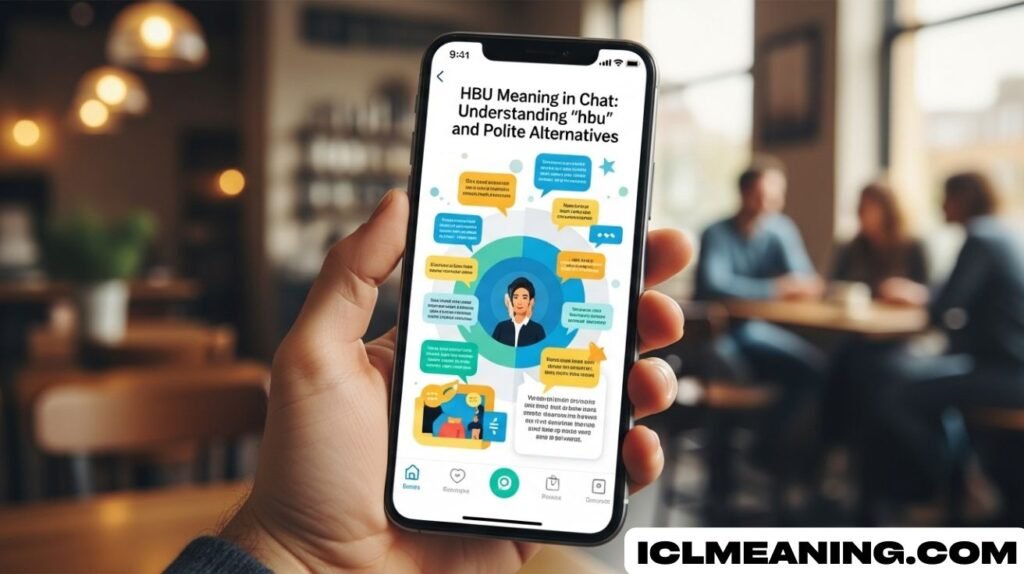
When it comes to polite alternatives to hbu, you can choose phrases based on how formal the conversation is. The English language offers many expressions that fit both casual vs formal communication styles. Below are three main tones to consider.
A. Polite / Formal Alternatives
In professional or academic conversations, you should use expressions that reflect respect. Examples include:
“And how about you?”
“What about yourself?”
“Could you please share your perspective?”
“How do you feel about that?”
These phrases work best in situations like meetings, reports, or emails. They show courtesy and professionalism while keeping your tone friendly and open.
B. Neutral / Everyday Alternatives
Neutral alternatives are suitable for coworkers, classmates, or online acquaintances. They strike a balance between politeness and simplicity. Try saying:
“How about you?”
“What’s your take?”
“Your thoughts?”
These fit perfectly in friendly conversation examples where the tone is relaxed but still clear.
C. Casual / Colloquial Alternatives
When texting close friends, short and fun phrases are fine. Examples include:
“You?”
“Your turn?”
“Same question to you!”
“Tell me what you think.”
These are ideal for quick replies or group chats. They fit modern online chat etiquette and feel natural in fast-paced messaging.
5. How to Choose the Right Alternative
Choosing what to say instead of “hbu” depends on context, relationship, and clarity. Understanding tone helps you avoid awkward or confusing moments in both personal and professional chats.
Tone of Situation
A formal setting like a work email or client message calls for full phrases such as “And how about you?” Meanwhile, casual text messages allow simple replies like “You?” or “Your turn?” Knowing when to use hbu is key to sounding appropriate.
Relationship With the Other Person
With your boss or a client, use polite phrases. With peers or friends, neutral options work. With your sibling or partner, casual versions feel natural. This adaptability is a major part of business communication tips and conversational tone in writing.
Clarity and Comprehension
When in doubt, use the full phrase “How about you?” It’s always clear and polite. Avoid slang if the audience might not understand it.
Read Also : Glizzy Meaning in 2025 – What It Stands For, Text Usage
6. 11 Real-World Examples
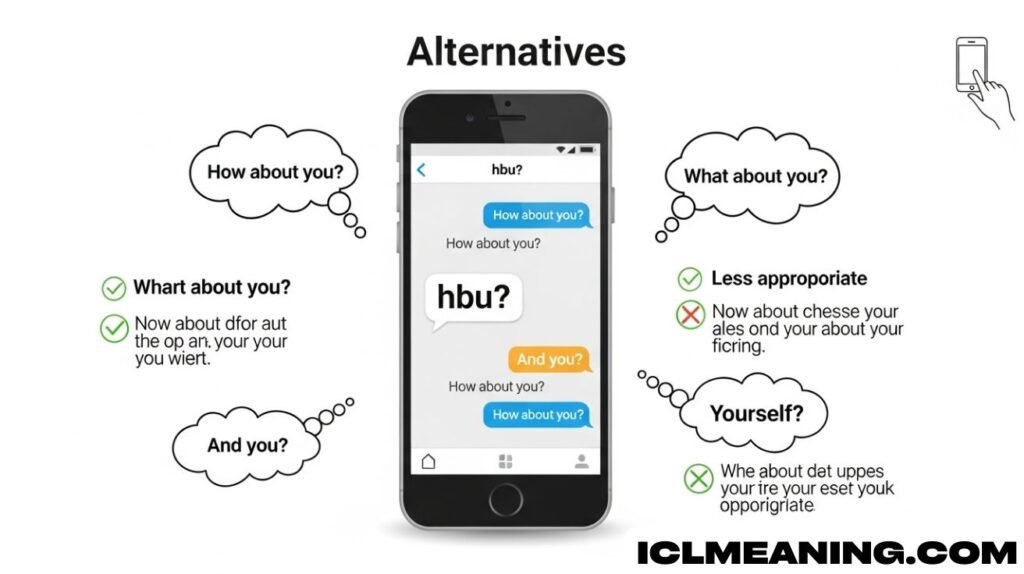
Here are real hbu reply examples across different tones in everyday American communication:
| Situation | Example Phrase | Tone |
| Work Email | “Thank you for your update. And how about you?” | Formal |
| Team Chat | “I finished the report; how about you?” | Neutral |
| Text Message | “Just got home, you?” | Casual |
| Client Message | “I appreciate your input. What about yourself?” | Formal |
| Group Chat | “Friday plans? Your turn to decide!” | Casual |
| Feedback Form | “I shared my notes; how do you feel about that?” | Polite |
| Slack Update | “I picked option A. What’s your take?” | Neutral |
| Instagram DM | “Just chilling, hbu?” | Casual |
| Study Group | “Done with my section, what about yourself?” | Neutral |
| Chat with Sibling | “I’m tired, you?” | Casual |
| Business Call Follow-Up | “Thanks for sharing your progress. Could you please share your perspective?” | Formal |
7. Nuances and Tone Explained
Small wording changes can affect tone and meaning. Saying “You?” feels friendly and short, while “And how about you?” sounds respectful. The first works for informal chats; the second fits business discussions. Understanding these differences helps you master casual vs formal communication effectively.
8. Why Variety Matters
Using only “hbu” can make your messages repetitive. Variety keeps conversations fresh and shows you care about how you communicate. In professional settings, switching to full phrases enhances your credibility and improves online chat etiquette.
9. Tips for Using These Alternatives
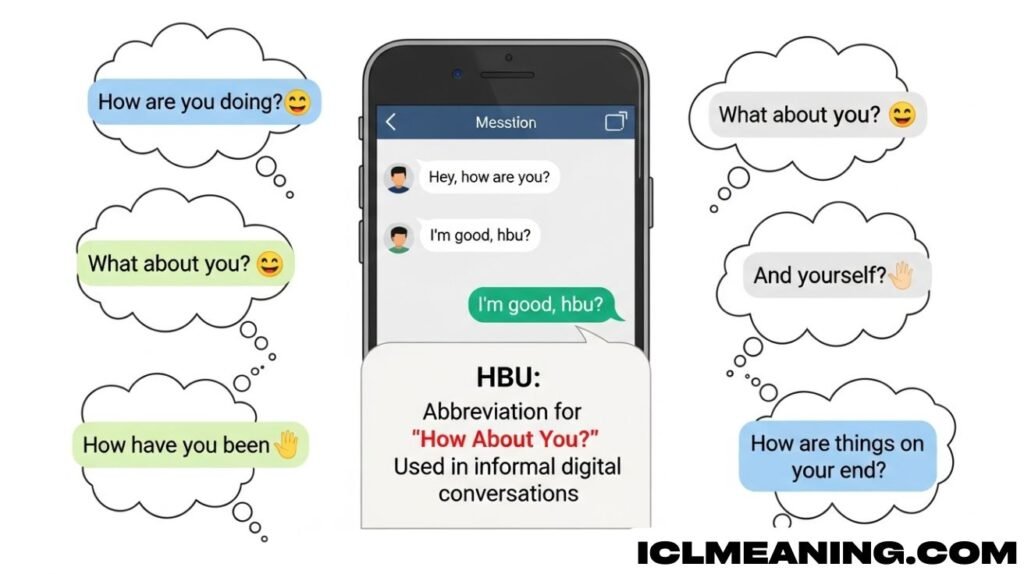
To use hbu in conversation correctly, think about your audience. With friends, be relaxed. With teachers or clients, stay formal. Practice polite ways to ask “how about you” in everyday communication. Always consider comprehension—avoid uncommon slang when unsure.
10. Common Pitfalls
Many people make simple mistakes with hbu in texting. Using it in a formal email can sound unprofessional. Overusing it can also feel robotic. And sometimes, abbreviations confuse people who aren’t familiar with text message abbreviations. To avoid mistakes, read your message out loud before sending it.
12. Practical Strategies for Integration
To build better digital communication habits, use polite alternatives to hbu in emails and LinkedIn messages. Save short forms like hbu in chat for WhatsApp, Snapchat, or personal texting. Over time, your writing will sound both friendly and respectful.
13. SEO & Readability Highlights
This guide uses NLP keywords and LSI keywords naturally, helping readers understand what does hbu mean while keeping the tone conversational. The structure ensures accessibility, proper online chat etiquette, and professional email tone. Google values such clear, user-focused writing.
14. Recap
To summarize, hbu in texting means “how about you?” It’s an example of informal texting language that works in friendly conversations but not in formal writing. Knowing when to use it helps maintain good tone and respect for your audience.
15. Final Practical Examples and Tone Check
| Situation | Example | Tone |
| Email to Manager | “And how about you?” | Polite |
| Slack Chat | “How’s your part going? What about yourself?” | Neutral |
| Text to Friend | “Just watching a movie, you?” | Casual |
| Client Follow-Up | “Could you please share your perspective?” | Formal |
| Group Chat | “Pizza or tacos tonight? Same question to you!” | Casual |
16. Avoiding Keyword Overuse and Google Traps
Search engines dislike overuse of keywords. This article maintains a natural balance, using terms like hbu meaning in chat, hbu full form, and what to say instead of hbu in a way that reads smoothly and feels human.
17. Hiatus Meaning & “hbu”
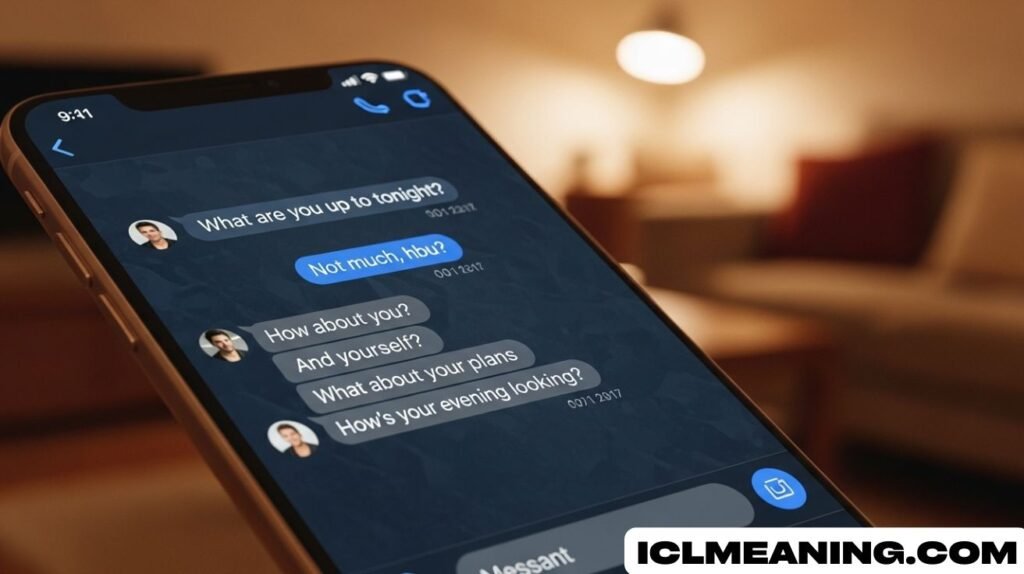
Sometimes, people confuse “hiatus” and “hbu.” But they’re unrelated. A hiatus means a break or pause, while hbu is a conversation prompt meaning “how about you?” Always keep these terms separate to avoid misunderstanding.
Writing for Voice Assistants and Accessibility
This article uses simple language and short paragraphs, making it easy for voice assistants and screen readers to interpret. Clear headings and quotes improve accessibility for all readers.
Summary Checklist (Quick-Read)
Know the meaning: “hbu” = “how about you?”
Use it casually: Great for friends, not for formal chats.
Choose tone wisely: Match words to situation.
Use alternatives: “What about yourself?” or “Your thoughts?”
Follow etiquette: Always respect context and clarity.
Origin and Rise of “hbu” in Texting
The meaning of hbu in text began during the early days of SMS when users had character limits. To save space, abbreviations like LOL, BRB, and hbu became popular among teens and young adults in the United States. These common internet acronyms quickly spread across chatrooms and messaging platforms.
Over time, hbu in texting became part of everyday language, especially on apps like Instagram, Snapchat, and WhatsApp. It’s a short, casual expression that fits perfectly in fast-paced conversations. Today, it remains a staple of informal texting language across generations.
Why “hbu” Can Sound Too Informal
While hbu slang meaning feels natural among friends, it can sound too casual in professional or academic contexts. Using it in emails or formal chats might appear unprofessional, especially if the recipient doesn’t understand texting slang examples or modern chat culture.
In business communication tips, experts recommend avoiding abbreviations in official messages. Using “And how about you?” or “What about yourself?” keeps your tone respectful and clear. Knowing the difference between casual vs formal communication can prevent misunderstandings and leave a better impression.
Polite and Professional Alternatives to “hbu”
Instead of “hbu,” use polite alternatives to hbu like “And how about you?” or “What about yourself?” These full phrases work well in business, interviews, or formal chats where you want to sound courteous and professional. They reflect respect and emotional intelligence.
In casual messages, neutral phrases like “How about you?” or “Your thoughts?” sound warm but still polite. These options balance friendliness with clarity and are great for maintaining a professional yet relaxed conversational tone in writing.
When to Use “hbu” and When to Avoid It
Use hbu in conversation with people you know well, such as friends, family, or close coworkers. It’s best suited for light, informal communication. For example, you might text, “I’m cooking dinner, hbu?” when chatting casually after work.
Avoid using it in emails, reports, or client messages. It’s not hbu appropriate or not in those contexts because it may seem unprofessional or confusing. Always consider your audience and the setting before using any social media slang or shorthand.
Examples and Case Studies
Let’s say you’re chatting with a friend: “Just got home, hbu?” works perfectly because it’s relaxed and brief. But in a job email, writing “I completed the report, hbu?” could sound too casual and abrupt. Instead, try “I’ve shared my progress. How about you?”
Another example involves generational differences. Younger users understand hbu reply examples, while older people may not. Being aware of your reader’s familiarity with texting slang examples ensures smoother communication and fewer misunderstandings.
Benefits of Using Alternatives
Learning what to say instead of hbu improves your overall communication. It shows you can adapt your tone and language to fit any situation. Phrases like “What’s your take?” or “How do you feel about that?” sound more engaging and professional.
Using alternatives also helps in business communication tips where tone matters. Polite phrasing shows confidence, emotional awareness, and respect. It’s a great way to strengthen relationships while maintaining professionalism in both casual and formal chats.
FAQs
What does HBU mean in chat?
HBU means “How about you?”, a casual and friendly way to ask someone the same question back during a chat or text conversation.
When a guy says HBU?
When a guy says HBU, he’s simply asking what you’re doing, feeling, or thinking, keeping the conversation going naturally.
What does HBY mean in chat?
HBY stands for “How about yourself?”, another informal version of “How about you?” often used in texting and online chats.
What does HBU and WBU mean?
Both HBU and WBU mean “How about you?”; they’re interchangeable text message abbreviations used to continue friendly online conversations.
Final Thought
Understanding hbu meaning in chat is part of mastering today’s online chat etiquette. It reflects how fast digital communication evolves, blending simplicity with friendliness. The key is to use it wisely and only in casual, familiar settings.
When writing for work, clients, or new connections, prefer full expressions over abbreviations. Choosing the right tone keeps conversations natural yet respectful. Remember: effective communication is about clarity, context, and care in every message you send.

